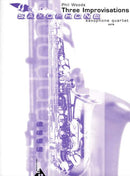| 作曲者 | Philbert de la Vigne |
| タイトル | Three Improvisations |
| 出版社 | advance music GmbH |
| 楽器編成 | 4 saxophones (SATBar) |
| 品番 | 9790206300745 |
| 難易度 | 上級 |
| 形状 | 72 ページ・Folder |
| 出版年 | 2001年 |
| 出版番号 | ADV 7662 |
| ISMN | 9790206300745 |
| ISBN | 9783892217237 |
Composer-revised and newly typeset 2001 edition, originally published by Kendor Music. Phil Woods: Born in Springfield, Massachusetts – November 2, 1931. Phil began saxophone lessons at age 12 with Harvey LaRose in Springfield. After graduation from high school at age 16, he went to New York City and spent one summer at Manhatten School of Music and four years at Juilliard Conservatory. My first influences were Benny Carter, Johnny Hodges and Charlie Parker. In the ´50s and ´60s he performed with his own working bands, some co-led by altoist Gene Quill. In the mid-1950s, Quincy Jones hired Phil to play lead alto in the big band that Dizzy Gillespie took to the Middle East for the State Department and in 1959, Quincy himself would hire Woods in the same capacity for the musical show FREE AND EASY, which folded in Europe. The band stayed on to tour there for one year. The list of musicians with whom Phil Woods has performed and/ or recorded reads like a Who´s Who of Jazz: Benny Goodman, Benny Carter, Clark Terry (with whom he founded the Big Bad Band with Clark and Melba Liston), Bill Evans, Michel Legrand, Oliver Nelson, Thelonious Monk, Dizzy Gillespie, and Charlie Barnet are just a few of those stars. In 1968, Phil went to live in Europe where he formed the European Rhythm Machine. Together they played all over the world until 1973 when Woods returned to the United States. After a brief stay in Los Angeles, Phil moved back to the New York area and formed The Phil Woods Quartet (now Quintet). Philip Wells Woods is a consistent poll winner, the recipient of an honorary Doctor of Letters Degree from East Stroudsburg University and a 1994 inductee into The American Jazz Hall of Fame.



